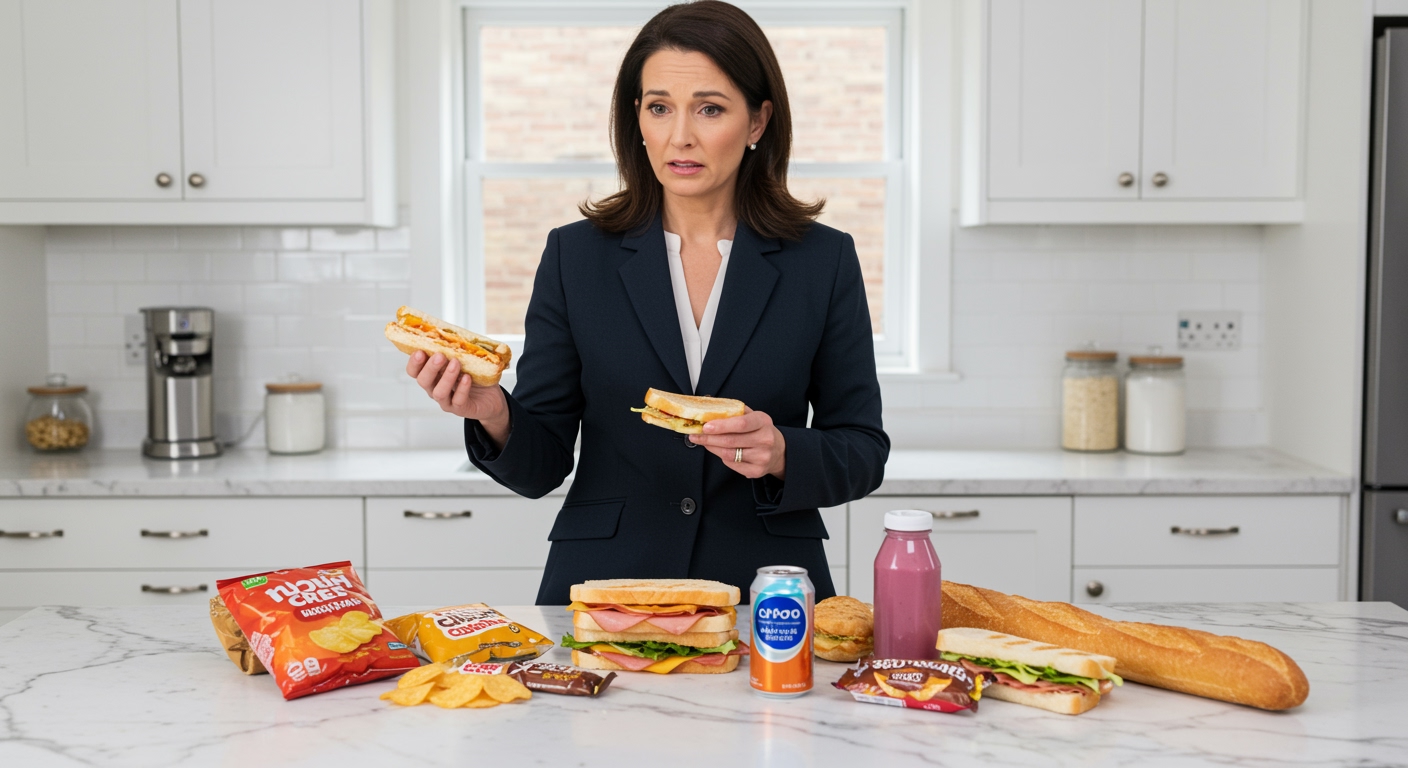✪ Key Highlight: UK meal deals exceed government calorie limits by 222%, with some containing 1,329 calories in a single lunch.
Introduction
Your quick lunch grab might be sabotaging your health goals without you knowing it.
New research from the University of Birmingham reveals that popular UK meal deals are secretly packed with dangerous calorie levels that exceed government recommendations by shocking margins.
Hi, I’m Abdur, your nutrition coach and today I’m going to analyze this alarming study about how convenient meal deals are undermining public health efforts across the UK.
What Makes These Meal Deals So Dangerous?
The government recommends a maximum of 600 calories for lunch meals to maintain healthy weight management.
However, researchers discovered that 23 percent of meal deals from five major UK retailers exceeded this limit significantly.
The most shocking finding was a single meal deal containing 1,329 calories – that’s 222 percent above the recommended guideline.
For women, this represents nearly their entire daily calorie needs in just one meal.
Men would consume more than half their daily calories from this single lunch choice.
The study examined meal deals from major supermarkets and high street stores, revealing a systematic problem across the industry.
✪ Fact: A single high-calorie meal deal can contain more calories than some people need for an entire day.
Which Foods Are The Biggest Culprits?
Triple sandwiches emerge as the worst offenders, averaging 657 calories each.
Baguettes follow closely behind with an average of 528 calories per serving.
The calorie count escalates dramatically when these main items combine with high-calorie snacks and drinks.
Smoothies add approximately 143 calories to the total meal deal package.
Energy drinks contribute around 127 calories on top of the main meal components.
Crisps and chocolate bars further inflate the calorie content, creating a perfect storm of excessive energy intake.
These combinations create meals that can easily exceed 1,000 calories when consumers think they’re making reasonable lunch choices.
✪ Pro Tip: Always check individual component calories before selecting your meal deal combination.
Why Does This Matter For Public Health?
Dr. Leek, the lead researcher, highlighted the fundamental contradiction in current food policy.
The government promotes healthy eating and weight management while allowing retailers to market calorie-dense combinations as convenient lunch options.
This creates an impossible situation for consumers trying to maintain healthy dietary habits.
Working people rely on meal deals for affordable convenience during busy schedules.
However, these same convenient options are systematically undermining national health goals.
The research, published in Public Health Nutrition, demonstrates how food marketing practices conflict with health recommendations.
This disconnect makes it incredibly difficult for individuals to achieve and maintain healthy body weight through normal food choices.
✪ Note: Excess calories from meal deals contribute to the UK’s rising obesity rates and related health costs.
What Solutions Could Actually Work?
Researchers suggest several practical approaches to address this calorie crisis.
Retailers could remove the highest-calorie items from meal deal promotions immediately.
Recipe reformulation offers another path to reduce calorie density without eliminating popular options.
Portion size adjustments could bring existing products within healthy calorie ranges.
The government could mandate that meal deal promotions only apply to combinations meeting the 600-calorie guideline.
Alternatively, legislation could require retailers to clearly display total calorie counts for complete meal combinations.
These changes would maintain the convenience and value that consumers expect while protecting their health.
✪ Pro Tip: Look for meal deals that include salads, fruit, and water instead of processed snacks and sugary drinks.
Are There Any Positive Trends Emerging?
The food-to-go sector is forecast to reach £24 billion by 2025, showing continued growth and importance.
Some retailers are responding to health concerns by offering tiered pricing systems with healthier options.
Premium meal deals now feature artisan breads and gourmet fillings that appeal to health-conscious consumers.
Functional foods containing omega-3s and adaptogens are becoming more common in upscale meal deals.
These innovations particularly attract affluent millennials in urban centers who prioritize nutritional quality.
However, value-conscious shoppers still represent the largest market segment.
This creates ongoing tension between accessible pricing and healthier food options across the industry.
✪ Fact: Consumer demand for fresh, high-quality foods is driving some positive changes in meal deal offerings.
The Bottom Line
UK meal deals are creating a public health crisis by normalizing excessive calorie consumption through convenient, affordable packaging.
Convenience should never come at the cost of your long-term health and wellbeing.
I’d love to hear your thoughts on meal deals and whether you’ve noticed their impact on your eating habits – please share your experiences in the comments below.
At NutritionCrown, we use quality and credible sources to ensure our content is accurate and trustworthy. Below are the sources referenced in creating this article:
- REHIS: Study shows majority of all dine-in dinner deals exceed UK government calorie guidance
- University of Birmingham: Lunch meal deals good for the wallet but not the waistline study
- Lumina Intelligence: Food to go trends 2025
- Food Bible: UK Food
- Student Beans: Best supermarket meal deals in the UK





